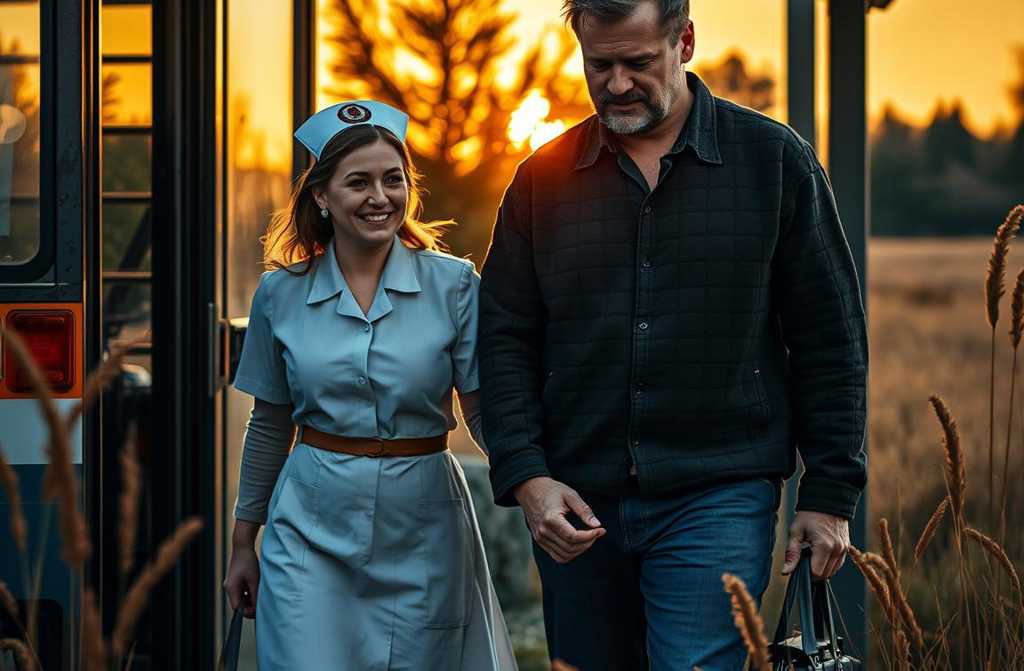The long shadows stretched thick and drowsy as the bus, having completed its daily journey from the grimy clamour of the city to the quiet backwater of the countryside, hissed to a stop beside the familiar post with its peeling blue sign. The doors wheezed open, and she stepped down. Catherine. The weariness of her twenty-hour shift as a hospital caretaker lay heavy as lead upon her shoulders, aching through the small of her back. The air, thick with the scent of cut grass and chimney smoke, was the first balm for her weary soul.
And he was the second.
He stood there, as he always did, day after day, year after year. His tall, broad-shouldered frame seemed to have grown roots by that bus stop, as much a landmark as the signpost itself. Edward. At the sight of her, his usually stern face softened with a quiet glow, warm and unreserved, pushing back the evening gloom.
Wordlessly, with a tenderness almost knightly in its constancy, he took her battered work bag from her hands. Their fingers brushed, and that fleeting touch alone was enough to smooth away some of the exhaustion. They walked along the dirt road leading hometheir homeslow and in step, their footfalls a steady rhythm, a silent song of shared existence.
“What a pair they make,” murmured one of the village gossips perched on a bench, her voice laced with envy. “Edwardbuilt like some hero out of a storybook, shoulders like an oak, that steady gaze of his. And her! Pretty as a picture, even now. Where does she find the strength, after those shifts? She practically glows.”
“Lucky Catherine, mustve slipped him a love potion,” chimed another, squinting after them. “Snatched herself a younger man, years theyve been together, and he still looks at her like shes something fallen from the stars. And the age gapwhat is it, ten years? More!”
Catherines neighbour and closest friend, Valerie, a woman with a sharp tongue and a kind heart, couldnt hold back. “Olive, Margaretmust you always flap your jaws? Ten years theyve been happy! Ten! And Catherine grows lovelier by the day beside him, while youll wither into dust from your own bitterness. Save your breath for something useful!”
Catherine and Edward were already too far to hear the familiar buzzing. Her hand rested in his, his shoulder a steady anchor whenever she needed to lean.
Fifteen years ago, her life had been less a path than a choked, mire-ridden track where every step sucked her deeper into despair. Back then, she wasnt “Catherine,” but the scornful “Cathy, that drunkards wife.” Her first husband, once a strapping lad, had drowned himself in the bottle. She fought at firstpoured out his whisky, begged, wept, hid money. The answer was bruises, curses, and the slow ruin of everything shed tried to hold together: family, respect, dignity.
The final straw came the night he, finding no hidden coins for drink, shattered her mothers vase and swung at their son. By dawn, shed bundled his meagre belongings and shoved him out of their crumbling cottageif it could even be called that. “Go back to your mother. Youre no husband, just a burden.” He vanished into the city, as so many like him did before.
She was left with two children: fifteen-year-old Paul, his youthful defiance hardened into grim responsibility, and eleven-year-old Emily, a fragile girl with frightened eyes. They hadnt asked to be born into this. And Catherine swore they wouldnt just survivetheyd live. Properly.
She was country-born, of this earth, and she knew the land wouldnt betray those who worked it. She took up the axe her husband had abandoned and learned to split logs. The stubborn wood fought back, her hands bled, but she split them. She expanded the garden into a field, planted every inch with potatoes. Bought a sow with her last pennies, and soon the yard rang with the squeals of piglets. A cow, chickens, turkeysher little kingdom, ruled alone. She kept her city job; money was still desperate.
Paul grew into a man too soon. Shoulder to shoulder with his mother, he hauled sacks, mended fences, cut hay. Their cottage, once sagging and dismal, slowly straightened. A patched roof, new windows that let in the sun. A secondhand pickupno farm could run without wheels. Catherine learned to drive it herself, raising eyebrows all through the village.
Life, slow and creaking, began to mend.
Three years later, Paul was called for national service. His absence gaped. She hired day labourers, but the weight still fell on her. Slender shoulders, but unyielding.
He returned taller, steadier, with a soldiers quiet gaze. Found work at the new agri-holdings on the old collective farm lands, under a stern but fair manager.
Then, one summer evening, Paul brought home a friend. A comrade from serviceEdward. Tall, painfully thin, with wide, sorrowful eyes.
“Poor lad, mustnt be fed proper at home,” Catherine thought, setting the table.
“Shes beautiful. Tired eyes, but kind,” Edward thought, and the realisation burned his cheeks.
From then on, Edward visited often. He seemed to know where a mans hands were needed: fixing a fence, cutting hay, tinkering with the pickups engine. Catherine was glad”Pauls found a true friend, a good soul.”
But slowly, her feelings shifted. In her heart, long asleep to anything but duty, something fragile and forgotten stirred. She caught his glances and looked away, cheeks betraying her. His quiet eyes held a question he wouldnt voice.
He visited less. And she fought harder against the thoughts of him that wouldnt leave. They pretended nothing had changed, but alone, the air between them crackled. She was forty, yet her heart raced like a girls, her head humming with some sweet, unknown tune.
In time, the village noticed. A place like this was a glass bowlnothing stayed hidden.
Edwards mother and sisters raged. “Shes old enough to be your mother! A disgrace! Some worn-out widow with baggage!” The hardest talk waited with Paul. He took Edward down to the riverbank, away from prying ears.
“Whats this about?” Pauls voice was quiet, dangerous. “My mother. Explain.”
“I love her, Paul,” Edward said, meeting his eyes. “As a woman. The strongest, the bravest, the most beautiful Ive ever known.”
They fought. A brutal, honest brawl, fists driving out the voices of mothers and neighbours. Bruised and bloody, they sat in the dirtand laughed. The anger was gone. What remained was tense, but unbroken.
“Enough hiding in the hedges like stray pups,” Paul rasped, standing. “Go home. But listen” He jabbed a finger at Edwards chest. “If I see her cry because of you, Ill kill you. And dont expect me to call you Dad.”
Edward moved in. The village gasped. It was good. Almost perfect. But sixteen-year-old Emily rebelled. To her, twenty-year-old Edward was a traitor, a trespasser on her fathers memoryworthless as hed been, he was still hers. She slammed doors, spat words. They waited. Loved her.
She calmed only when she fell wildly in love herself and married. Only then did she understandlove had no age, and happiness no borders.
Paul married too, a quiet, kind girl. Life rolled on.
Then the impossible happened. Catherine, at forty-three, was expecting. The world flipped upside-down. The cruel jest of fate? Her daughter-in-law was pregnant too. They attended check-ups together, drawing awed smiles from the doctors.
Then came the day. They lay in the same maternity ward, mother- and daughter-in-law, clutching hands, laughing through tears at the madness of it. Catherine went firsta sturdy boy, Michael. Two days later, her daughter-in-law gave her a grandson, little Stephen.
The village buzzed anew. The gossip burned, but now with wonder, not venom.
Catherine and Edward finally married. Shed always brushed it off before.
“Why fuss with papers? Youre not going anywhere,” shed laughed.
“I want to be your husband. Properly,” hed insisted.
They wed quietly. Outside the registry office, he pulled her close. “Forever now, Cathy.”
They walked the same road as a decade before. Hetall, solid, her steadfast oak. Shestill graceful, bright-eyed, younger somehow. His hand swung her work bag; her heart beat with a hard-won, boundless joy.
Let some judge, let others cheer. They were two. Together. That was all that mattered.
Life with Edward wasnt just a new chapterit was a rebirth. Each day held a light shed forgotten. He was her rock, his warmth better than sunlight.
Michael grew lively and curious, his laughter filling the house. Catherine often marvelledhow strange and sweet fate could be, to find love so late. Edward never tired of small kindnesses: coffee brought to her in bed, warm socks slipped onto her feet as she dozed.
Emily, with time, softened. Resentment gave way to understanding, then respect. Even Paul, protective as he was, couldnt deny the peace in their homethe quiet certainty of love. He travelled often but always returned to open arms.
One autumn evening, under a sky dusted with stars, Catherine and Edward sat on the porch, listening to the wind in the leaves.
“You know,” she said softly, “I never thought Id get another chance at happiness. Thank you for that.”
Edward smiled. “Well prove its never too late. Just dont stop fighting for it.”
In that promise lay everythinghope, strength, love.
In time, Catherine became a quiet legend in the village. Proof that life could begin anew, that age was no barrier. Her story was whispered with admiration.
Each morning, watching her children and husband, she knew: late joy was still joy. You only had to let it in.
The road had been rough, but now their home held the peace shed dreamed of for years. With it wrapped around her, Catherine faced each new day sure of one thingtrue happiness knew neither time nor limits.







